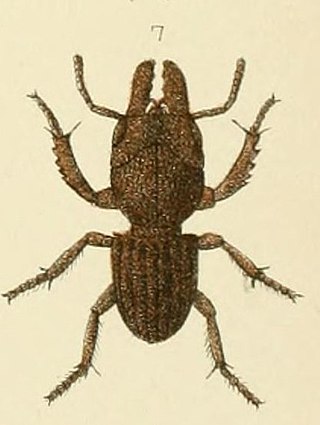
Stag beetles are a family of about 1,200 species of beetles in the family Lucanidae, currently classified in four subfamilies. Some species grow to over 12 centimetres, but most to about 5 cm (2 in).

The false stag beetles (Diphyllostoma) are a group of three species of rare beetles known only from California. Almost nothing is known of their life history beyond that the adults are diurnal and females are flightless; larvae have not been observed.

Scarabaeoidea is a superfamily of beetles, the only subgroup of the infraorder Scarabaeiformia. Around 35,000 species are placed in this superfamily and some 200 new species are described each year. Its constituent families are also undergoing revision presently, and the family list below is only preliminary. This superfamily includes some of the largest beetles extant today, including rhinoceros beetles, (Dynastinae), the Hercules beetle and Goliath beetles.

Dorcus is a genus of beetles in the stag beetle family Lucanidae. Of the over 100 species, most occur in Asia and India; two are found in southern Europe, and two species are from North America. Previously, specimens with serriform teeth on the mandibles and sable pigment were called Serrognathus whereas specimens with but a singular or multiple bulky notches on the mandibles and lustrous sable pigmentation were called Dorcus.

The Lucaninae comprise the largest subfamily of the stag beetles (Lucanidae).

Lucanus cervus, known as the European stag beetle, or the greater stag beetle, is one of the best-known species of stag beetle in Western Europe, and is the eponymous example of the genus. L. cervus is listed as Near Threatened by the IUCN Red List.
The Lucanidae are a family of beetles that include the stag beetles. The family can be further subdivided in a taxonomy. The classification presented here follows Smith (2006), with the exception of the tribal classification within the Lucaninae.

Chiasognathus grantii is a species of stag beetle found in Argentina and Chile. It is known as Darwin's beetle, Grant's stag beetle, or the Chilean stag beetle.

Cyclommatus is a genus of the family Lucanidae, also known as the stag beetle. The majority of the species from the genus Cyclommatus are located in Southeast Asia, though some species are found in China and Taiwan as well. The genus Cyclommatus also consists of three subgenera: Cyclommatus, Cyclommatinus and Cyclommatellus. Each subgenera contains 80, 24 and 3 species respectively. In total, the genus Cyclommatus consists of a total of 134 species, though more are still being discovered to this day.

Hexarthrius parryi, the fighting giant stag beetle, is a species of large stag beetles. It belongs to the genus Hexarthrius of the tribe Lucanini. It is classified under the subfamily Lucaninae of the stag beetle family Lucanidae.

Lamprima aurata, the golden stag beetle, is a species of beetle in the family Lucanidae. In Tasmania, this species is referred to by the common name of Christmas beetle, a name that is normally used for beetles in the family Scarabaeidae, genus Anoplognathus.

Hexarthrius mandibularis is one of the world's largest stag beetle. It belongs to the tribe Lucanini, in the family Lucanidae.

Paralissotes reticulatus, also called the New Zealand reticulate stag beetle, is a native species of stag beetle from New Zealand. Although they do have wings they are flightless.

Mitophyllus is a genus of large stag beetles endemic to New Zealand.

Cyclommatus elaphus is a species of the genus Cyclommatus from Indonesia. It is also the largest species of the genus Cyclommatus and can grow up to a maximum of 109 mm from the tip of the mandibles to the end of the abdomen.

Geodorcus novaezealandiae is a large flightless species of stag beetle in the family Lucanidae. It is the type species and smallest member of the genus Geodorcus. It is endemic to New Zealand.

Apterocyclus is a genus of rare stag beetles in the family Lucanidae. There are about five described species in Apterocyclus. The species of Apterocyclus are found only on the island of Kauai in the Hawaiian Islands, and are the only scarabaeoid beetles native to the Hawaiian Islands.

Apterocyclus waterhousei is a species of stag beetle in the family Lucanidae. The rare, flightless beetle is found only on the island of Kauai in the Hawaiian Islands. It has been reported in several locations on the island in recent years.

Aegus is a genus of stag beetles in the family Lucanidae. Comprising about 260 species in the genus, they are placed in the largest subfamily Lucaninae. They are distributed in South Asia, Southeast Asia and the Pacific countries, but introduced accidentally to many parts of the islands.

Figulus is a genus of beetle in the family Lucanidae. They have a paleotropical distribution, including occurrences in Australia.


















